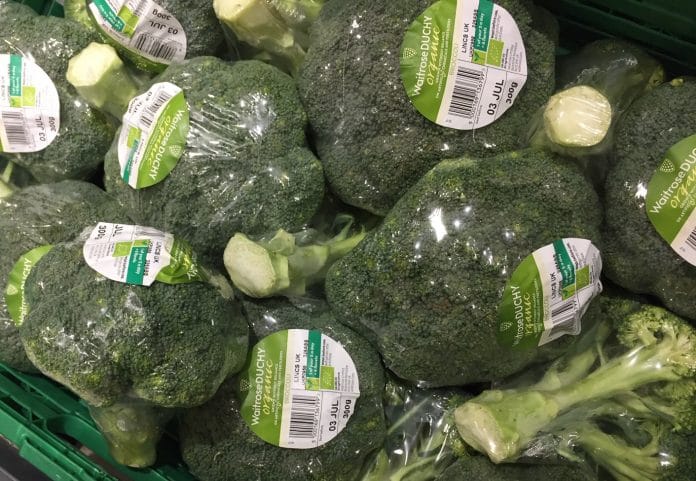The amount of plastic produced and used by UK supermarkets rose this year, according to a report published jointly by Greenpeace and the Environmental Investigation Agency.
 Despite pledges from the big grocery operators to cut down on packaging, the report – Checking Out on Plastics II: Breakthroughs and backtracking from supermarkets – shows that plastic packaging increased in 2019 by 17,000 tonnes to 900,000.
Despite pledges from the big grocery operators to cut down on packaging, the report – Checking Out on Plastics II: Breakthroughs and backtracking from supermarkets – shows that plastic packaging increased in 2019 by 17,000 tonnes to 900,000.
Only Waitrose, Tesco and Sainsbury’s managed to achieve small reductions.
A bag not for life
Especially alarming, says the report, has been a steep rise in sales of so-called ‘bags for life’, with millions of shoppers purchasing them as a single-use option even though they contain far more plastic than conventional single-use carriers.
In 2019, ten supermarkets representing 94.4% of the grocery retail market reported selling an astonishing 1.5 billion bags for life, up by about 25% on last year based on market share. Iceland saw sales of bags for life rise tenfold, from 3.5 million to 34 million.
In real terms, 1.5 billion bags for life sold in the past year represents about 54 per household in the UK – or a staggering 22 bags each per man, woman and child.
EIA ocean campaigner Juliet Phillips said: “It’s shocking to see that despite unprecedented awareness of the pollution crisis, the amount of single-use plastic used by the UK’s biggest supermarkets has actually increased in the past year.
Throwaway culture
“Our survey shows that grocery retailers need to tighten up targets to drive real reductions in single-use packaging and items. We need to address our throwaway culture at root through systems change, not materials change – substituting one single-use material for another is not the solution.”
The survey reveals the big brands supplying supermarkets are the driving factor behind the rise in plastic packaging, indicating supermarkets had failed to compel suppliers to take action.
According to the report, only Tesco gave suppliers an ultimatum to cut excessive plastic or have products delisted.
Waitrose scored highly in the new report because it cut the amount of plastic packaging used and is looking to scale-up innovative trials for packaging-free refill stations for products such as coffee, rice, pasta, wine and detergent.
Morrisons meanwhile became the first retailer to set a quantified target to increase reusable and refillable packaging. It also started its own refill trials and made loose and refillable ranges 10% cheaper than packaged counterparts.
Waitrose less impressive on organic
While Waitrose scored better than most supermarkets on plastic use in the report, the retailer has significant failings in the packaging of organic fruit and vegetables.
In a large branch visited by Natural Products Global (NPG) this year, no organic produce was available loose (whereas there is good choice of loose conventional produce). The majority of Duchy Originals brand organic fruit and vegetables was packaged in non-recyclable plastic bags.
Waitrose told NPG that where organic produce was packaged in this way it was ‘to prevent mix-ups with conventional products so that customers can be sure they are buying organic’ and for ‘differentiation purposes’.











